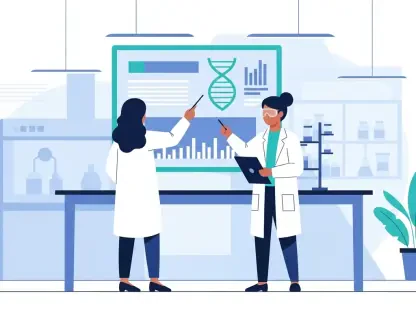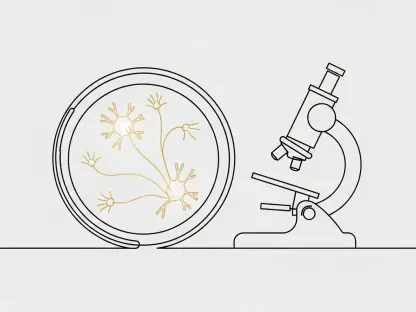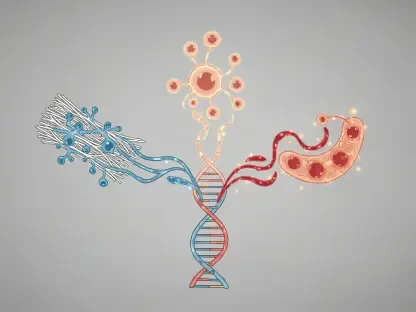Tina Knowles’ personal experience with breast cancer serves as a powerful reminder of the critical importance of regular screenings. When Knowles missed her mammogram appointments for four years, it led to a delayed diagnosis of stage 1A breast cancer. Her story underscores the life-saving potential of early detection and serves as a call to action for women everywhere.
The Crucial Role of Regular Screenings
Consequences of Delayed Mammograms
Tina Knowles’ journey began when she neglected her scheduled mammogram appointments over a span of four years, which resulted in a stage 1A breast cancer diagnosis. Experts insist that early detection through regular screenings greatly enhances the chances of successful treatment, potentially reducing the intensity and duration of necessary medical interventions. The implications of delaying mammograms can be severe; as in Knowles’ case, the cancer might advance to a more critical stage, requiring more invasive treatments and possibly reducing the chances of a full recovery.
The primary takeaway from Knowles’ experience is the emphasis on not ignoring or postponing scheduled screenings. Delaying mammograms, especially for those in higher-risk categories, can have dire consequences. Regular screenings play a pivotal role in detecting breast cancer at its earliest and most treatable stages. Medical data and expert opinions overwhelmingly show that consistent adherence to screening schedules leads to better health outcomes and lowers mortality rates associated with breast cancer.
Expert Advice on Screening Practices
Medical professionals, including Dr. Tatiana Kelil, emphasize that mammograms are the most effective tool for early breast cancer detection. In specific cases, an MRI might be required for a more detailed examination, especially for women with dense breast tissue or a family history of breast cancer. The overarching consensus in the medical community is for women to adhere strictly to the screening schedules suggested by healthcare providers. Regular screenings play a significant role in identifying cancer early, when it is most likely to be successfully treated.
Screenings have proven to significantly reduce the relative risk of dying from breast cancer, emphasizing the importance of adherence to these guidelines. Health professionals continually advocate for the significance of mammograms and, in certain circumstances, recommend supplementary screening methods for high-risk individuals. The guidance from experts is clear: maintaining regular screening appointments is essential for early cancer detection and effective treatment, and women are encouraged to discuss personalized screening plans with their healthcare providers.
Personal Advocacy and Health Awareness
Tina and Matthew Knowles’ Cancer Experiences
Knowles’ experience, coupled with her former husband Matthew Knowles’ own battle with breast cancer, highlights that this disease can affect anyone. After undergoing surgery to remove both benign and cancerous tumors, Tina Knowles is now cancer-free and actively advocates for routine breast examinations and early detection. Their combined experiences serve as poignant reminders that breast cancer is not limited by gender and can strike anyone, underscoring the necessity for vigilance in health monitoring.
Their personal battles with cancer have inspired them to use their platforms to spread awareness and encourage others to prioritize regular health screenings. By sharing their stories, the Knowles duo aims to demystify the disease, reduce stigma, and empower individuals to take proactive steps in their health journeys. Advocating for routine examinations and early detection, Tina Knowles’ experiences serve as a beacon for others navigating similar health challenges, emphasizing the importance of proactive measures and regular screenings.
Navigating the Healthcare System
In her advocacy, Knowles shares her encounters with condescending healthcare professionals, stressing the importance of seeking second opinions and being proactive about one’s health. This first-hand account demonstrates the necessity for patients to advocate for themselves within the healthcare system. By openly discussing her experiences, Knowles highlights the importance of personal advocacy, resilience, and persistence in securing appropriate and respectful medical care, urging patients to stand firm in seeking the best possible treatments.
Self-advocacy plays a crucial role in navigating healthcare and ensuring one’s concerns are taken seriously. Knowles’ story serves as a reminder that patients have the right to seek thorough and empathetic care, especially when health issues are involved. By sharing her story, Tina Knowles encourages others to voice their concerns confidently, pursue multiple opinions, and strive for the best possible care, reinforcing the importance of being one’s own health advocate in overcoming challenges within the medical system.
Breast Cancer Screening Guidelines
Recommendations from the American Cancer Society
The American Cancer Society recommends that women aged 40 to 44 have the option for annual mammograms. For women aged 45 to 54, yearly mammograms are advised, while those aged 55 and above may switch to mammograms every other year, continuing for as long as they remain in good health and are expected to live at least another ten years. These guidelines serve as a comprehensive approach to managing breast cancer risks through consistent and timely screenings, tailored to varying age groups and health conditions.
By following these recommendations, women can proactively manage their health, ensuring timely detection of potential breast anomalies. The guidelines also encourage ongoing discussions between women and their healthcare providers to determine the best individualized screening approach. This personalized strategy ensures that women receive care tailored to their specific needs and health profiles, ultimately enhancing the effectiveness of cancer detection and treatment.
Mammogram Technology and Effectiveness
Despite advancements in mammogram technology, including 3D versions, there is still a 20-30% chance that some cancers may be missed. However, these screenings remain a crucial component of early detection strategies, and annual mammograms are particularly recommended for monitoring fast-growing cancers in their early stages. The evolution of screening technologies has improved detection rates, yet the importance of regular mammograms lies in their ability to identify cancer at a stage where it is most treatable and manageable.
The importance of regular mammograms cannot be overstated. Despite potential limitations, they remain an indispensable tool in detecting abnormalities that could signify early stages of breast cancer. Continuous advancements in screening technology, coupled with adherence to recommended screening guidelines, ensure the early detection and successful treatment of breast cancer, thus improving survival rates and quality of life for women everywhere.
Understanding Breast Cancer Risks
Variability in Cancer Treatment
Breast cancer treatment options vary significantly based on the stage of detection and the aggressiveness of the disease. Common treatments include surgery, radiation, chemotherapy, immunotherapy, hormone therapy, and targeted therapies. Early detection generally leads to less aggressive treatment plans, emphasizing the critical role of regular screenings in managing health effectively and efficiently. The variability in treatment approaches highlights the importance of early and accurate detection, which can significantly affect treatment outcomes and overall survival rates.
Regular screenings facilitate early detection, allowing for a wider range of effective and less invasive treatment options. This approach not only enhances the chances of successful treatment but also reduces stress and recovery time for patients. Understanding the nuances of different treatment plans and the benefits of early detection underscores the importance of adhering to screening schedules, empowering women to take control of their health and improve their odds of successful treatment and recovery.
Special Considerations for Younger Women
Younger women, especially those under 40, may face challenges due to denser breast tissue, which can make mammogram interpretation more difficult. Furthermore, younger women are more likely to encounter aggressive forms of breast cancer, necessitating earlier and possibly more frequent screenings for those with higher risk factors. Recognizing these unique challenges, healthcare providers often recommend additional screening modalities to ensure accurate and comprehensive cancer detection in younger women.
Given the aggressive nature of breast cancer in younger women, early and thorough screening is paramount. Tailored screening approaches that take into account dense breast tissue and individual risk factors ensure that younger women receive accurate diagnoses and timely treatments. Understanding these special considerations underscores the importance of personalized screening plans, empowering younger women to proactively monitor their health and advocate for the most suitable and effective screening methods available.
Addressing Health Disparities
Risks for Black Women
Black women are at greater risk for developing aggressive forms of breast cancer, such as triple-negative breast cancer. Factors like racism and added stress can contribute to the development of more aggressive tumors in this demographic, making early and regular screenings even more critical. The heightened risk for Black women underscores the necessity for targeted awareness campaigns and increased access to preventive care and screenings tailored to address these specific health challenges.
Proactive measures, including culturally sensitive healthcare practices and increased educational initiatives, are essential in mitigating these risks. By addressing the unique challenges faced by Black women in breast cancer detection and treatment, healthcare providers and advocates can work towards reducing disparities and improving overall outcomes. Ensuring that Black women receive timely and appropriate screenings is crucial in combating the disproportionate impact of aggressive breast cancer within this demographic.
Advocacy and Equitable Healthcare Access
Addressing structural barriers in healthcare access is essential for improving breast cancer outcomes among Black women and other marginalized groups. Equitable access to preventive measures, timely diagnoses, and effective treatments is paramount in reducing disparities and ensuring better health outcomes for all. Advocacy for equitable healthcare access involves not only policy changes but also community-based initiatives and education to bridge gaps in awareness and accessibility.
Efforts to dismantle systemic hurdles in healthcare pave the way for more inclusive and effective cancer care. By promoting policies and practices that ensure fair and equal access to medical resources, communities can make significant strides in addressing health disparities. Advocacy for healthcare equity is a crucial step towards ensuring that all individuals, regardless of background, receive the care and support they need for early detection and successful treatment of breast cancer.
Overarching Insights
Tina Knowles’ personal battle with breast cancer highlights the vital importance of regular screenings for early detection. After neglecting her mammogram appointments for four years, Knowles received a delayed diagnosis of stage 1A breast cancer. Her experience serves as an urgent reminder of the life-saving potential that comes with early screening. Knowles’ story isn’t just about her health scare; it’s a crucial call to action for women everywhere to prioritize their health and get regular check-ups. Breast cancer caught early can be treated far more effectively, often before it spreads or becomes more advanced. Missing routine exams can result in catching the disease at a later, more dangerous stage when treatment can be less effective and more difficult. Knowles’ experience strongly underlines the message that consistent mammograms can make a significant difference in outcomes. Her story is a poignant example of how proactive health measures can potentially save lives and prevent heartache.









